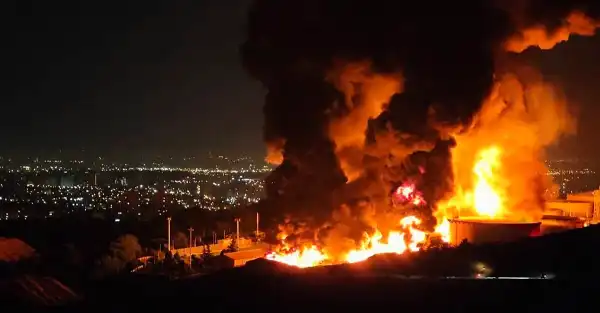
Iranian missiles struck Israel's Tel Aviv and the port city of Haifa before dawn on Monday, destroying buildings and heightening fears among world leaders at an upcoming G7 meeting that the standoff between the two longtime foes could lead to a wider regional conflict.
The latest Iranian attacks killed at least five people, the National Emergency Services said, bringing the death toll in Israel to at least 18 since Friday. At least 100 people were wounded in the overnight attacks, which were Tehran's response to Israel's preemptive strikes on its nuclear and ballistic missile programs.
Search and rescue operations are continuing in Haifa, where about 30 people were injured, rescue services said, while dozens of rescuers were heading to the affected areas. Media reports said fires were burning at a power plant near the port.
Video showed several rockets flying over Tel Aviv, with explosions heard there and in Jerusalem. Several apartment buildings in a densely populated Tel Aviv neighborhood were destroyed, blowing out windows in hotels and other nearby homes just a few hundred meters from the U.S. Embassy in the city. The U.S. ambassador said there was little damage to the building and no staff members were hurt.
Gaido Tetelbaun was in his apartment in Tel Aviv when the alarm was received shortly after 4am (01:00 GMT).
“As usual, we headed to (the shelter), which is right across the street. And a few minutes later, the door (of the shelter) was knocked down,” said the 31-year-old chef.
“Several people came in covered in blood, all wounded. And then, when we returned to the apartment, after everything had calmed down, we saw that there was almost nothing left there… The walls had collapsed, there was no more glass,” he added.
“It's scary because you don't know what's going to happen next. It could be the beginning of a long period, or it could get worse, or hopefully it could get better, but it's the unknown that's scary.”
The rockets hit an area near Shuk HaCarmel, a popular Tel Aviv market that is usually crowded with locals and tourists buying fresh fruit and vegetables and visiting bars and restaurants. Residential streets in neighboring Petah Tikva and a school in the ultra-Orthodox Jewish city of Bnei Brak were also hit.
“New Method”
Iran's Islamic Revolutionary Guard Corps said the latest attack used a new technique that caused Israel's multi-layered defense systems to target each other.
“The initiatives and capabilities used in this operation, despite the full support of the United States and Western powers, as well as the availability of the most modern defensive technologies, led to the successful and maximum destruction of missiles of targets in the occupied territories,” the statement said.
The Israeli military did not immediately respond to a request for comment on the strikes. Israeli officials have repeatedly stressed that their Iron Dome defense system does not provide 100 percent protection and have warned of difficult times ahead.
The death toll in Iran has risen to at least 224, with 90 percent of them civilians, according to a health ministry spokesman.
On Monday morning, the Israeli military reported that it had carried out new strikes on command posts of the Islamic Revolutionary Guard Corps and the Iranian military.
Leaders meet
Leaders of the Group of Seven nations began meeting in the Canadian Rockies on Sunday, with the conflict between Israel and Iran expected to be a top priority.
German Chancellor Friedrich Merz said his goals at the summit included demanding Iran stop developing and possessing nuclear weapons, ensuring Israel's right to self-defense, preventing escalation of the conflict and creating space for diplomacy.
“This issue will be at the center of the agenda of the G7 summit,” Merz said in an interview with reporters.
Before flying to the summit on Sunday, US President Donald Trump was asked what he was doing to de-escalate the situation. “I hope there is an agreement. I think it's time for a deal,” he told reporters.
Sourse: breakingnews.ie






